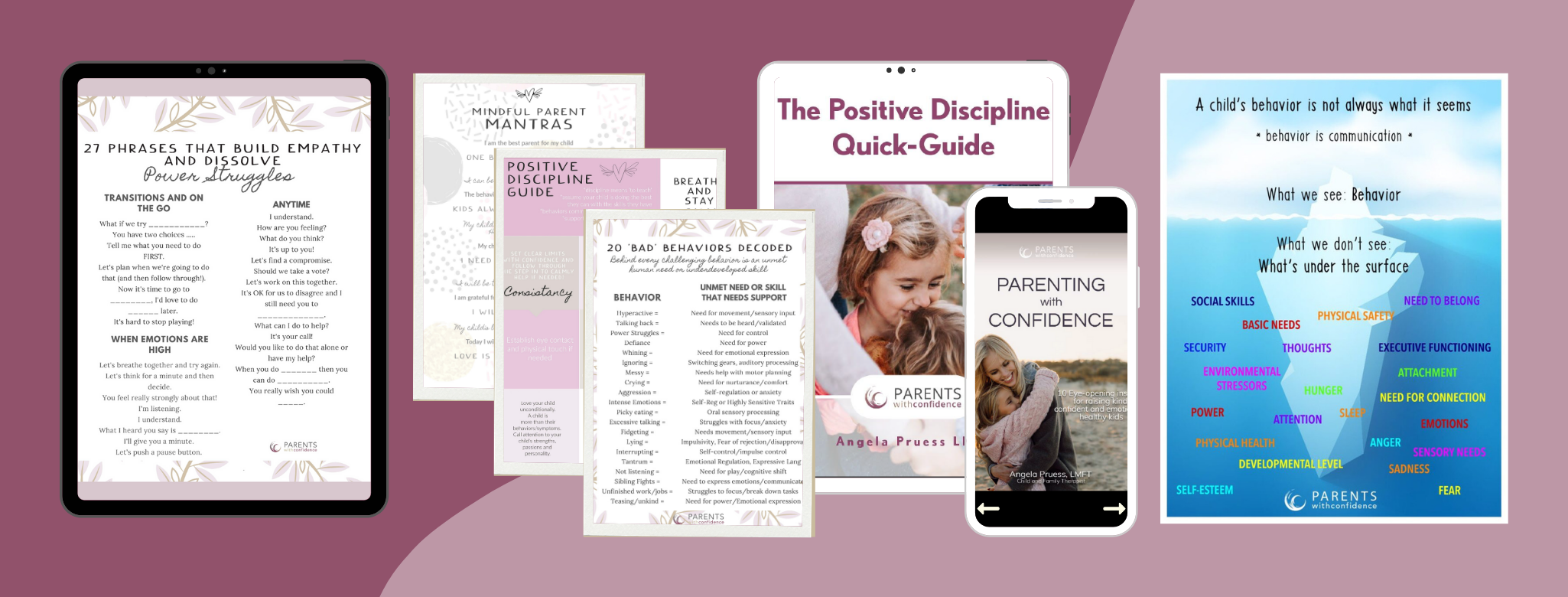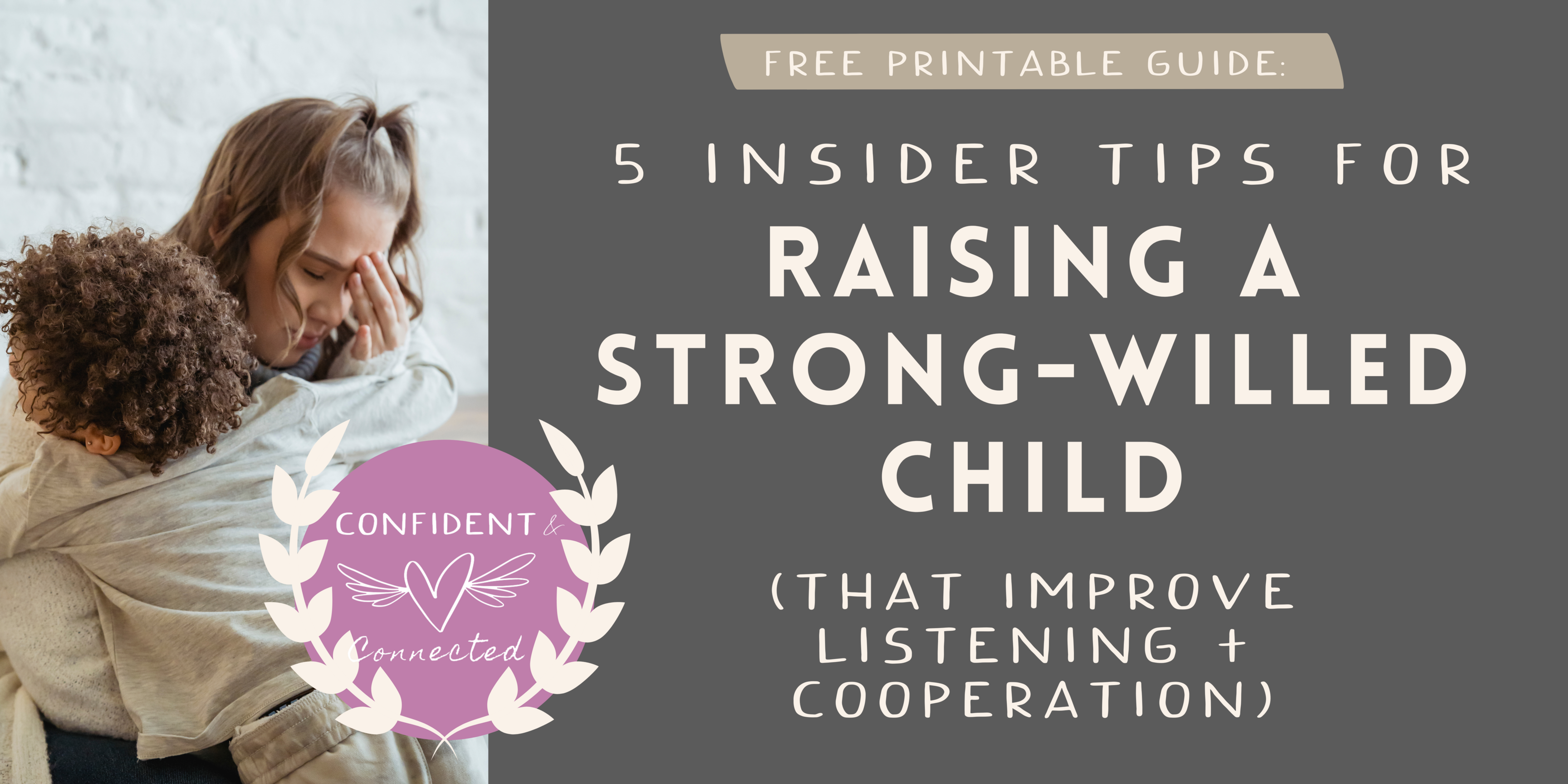7 Eye-opening Reasons Your Child Isn’t Listening (and what to do about it)
Inside: Discover common reasons grounded in child development why your child isn’t listening or responding to your prompts or directives and how to get your child listening.
If you find yourself musing “How do I get my child to listen?!” on a semi-regular basis, congratulations!! (Yes, I really mean that.)
You have successfully helped create a full-on human being and not a robot.
While some days you may wish you could program your child’s hard drive so they’d simply follow you around passively, hanging on every command, but realistically we’d expect more from a human being, wouldn’t we?
What we often fail to recognize as parents is that human beings are complex and have many reasons for behaving the way they do.

Almost always, the behaviors of your little human are communicating something to you.
Surprised? Parents often miss these hidden messages because when your child doesn’t listen you quickly get frustrated, stressed and emotionally triggered, focusing your attention on your own emotions and thoughts as opposed to theirs.
The Secret to Get Your Child Listening the Right Way
When you’re stuck in your own narrative of hustle, frustration, and control, it will always feel like a struggle to get your child to listen in an effective and respectful way.
So what’s the secret to getting your child listening consistently and willingly?
Stop taking your child’s behavior personally and start looking for what it might be communicating to you.
You’ll be surprised to discover that underneath what appears to be a ‘child who refuses to listen’ are in fact healthy and typical primary human needs or underdeveloped skills that are in need of further support.
7 Questions to ask when your child isn’t listening
When you stop viewing your child not listening as a personal affront, you can start getting curious about what’s making listening difficult for them at that moment.
Here are 7 questions to ask yourself if you’re child is stuck in a ‘listening-rut’.
Related resource >> Want to MASTER Positive Discipline that will teach your child without shaming? Check out my Positive Discipline Quick-Start Set! (on sale for 40% off for limited time!)
Am I communicating effectively with my child?
Communication goes far deeper than words when it comes to talking to your child.
Everything from the tone of your voice, to physical posture and energy you bring to the interaction, will affect how your communication lands and is responded to.
To keep your communication methods in check ask yourself, Am I rushed? Stressed? Annoyed?
If you approach your child with the intent of controlling them and discharging your own anxiety they’ll pick up on this and become overwhelmed.
The way you communicate both verbally and non-verbally can inspire motivation, encouragement, and confidence or overwhelm and resistance.
Is my child stressed?
Ready to hear the most important thing you’ll learn all day? Very very often when your child is misbehaving on the outside, it is because there’s something stressing them out on the inside.
As it turns out, the ‘defiant’ child not getting in the car when asked may be worried about going to the dentist today or seeing a friend at the park who sometimes picks on them.
A wonderful quote from Dr. Stuart Shanker says it all, “The instant you recognize that your child isn’t willfully misbehaving but rather, that he’s under too much stress, your own stress suddenly drops”

Does my child have an unmet physical need?
Sometimes when kids don’t listen it comes down to basic neuroscience. In order to listen, your child needs the thinking part (frontal cortex) of their brain to be functioning well.
If you’ve ever felt yourself going ‘braindead’ when you haven’t had enough to eat or forgetting to put shoes on before you go to the grocery store because you’re raising an infant who isn’t sleeping at night, then you’ve experienced a compromised frontal cortex!

Keep in mind that your child will struggle even more when they’re hungry, thirsty, tired ect because their pre-frontal cortex is still under major development.
Related read>> 10 Simple Everyday Ways to Improve Child’s Behavior and Mood
Have I provided opportunities for my child to feel in charge today?
Every human large and small has certain basic human needs and two human needs that sit on the top of the list are the needs for power and control (kids with strong-willed child characteristics will have even more needs in this department!).
To be a healthy human is to feel and be allowed to exercise a healthy degree of control over yourself and autonomy over your environment.
When your child isn’t getting opportunities to make small choices about their day and is feeling overly controlled and powerless, they might attempt (subconsciously not intentionally) to get their needs for power and control met by stating a firm “No!” when being asked to put on winter boots.
Does my child need help to take the next step?
There are many kids who innately struggle with listening and transitions by nature of what developmental stage they’re in, or the way their brain is wired.
Many different cognitive processes go into listening and making successful transitions, so children who have challenges with executive functioning (seemingly basic skills to execute tasks, housed in the frontal lobe) areas such as auditory processing, motor planning, focus, working memory, etc will need more guidance and support ongoing.
Help your child take the next step by getting as specific and concrete as possible with your directions as well as simply asking “How can I help?”
Is my child feeling disconnected?
If you think of the parent-child relationship in terms of a house, the emotional connection would be the foundation holding it up.
When it comes to getting your child listening without fear, threats, and negativity connection is the home base you should always come back to.

When your child doesn’t feel seen heard and valued, they’ll have very low intrinsic (internal) motivation to cooperate and do things they don’t want to do, when they don’t want to do them.
Just like you, they feel most motivated and inspired to ‘step-up’ for others who they feel closest to through via mutual expression of love and respect.
Do you ask over and over but your child still doesn’t listen? >>Grab your free Guide for Parents Raising Spirited Strong-willed Kids
Have I set fair expectations?
Imagine being fully engrossed in your latest book only to be interrupted by your partner who suddenly demands that you get up and come along to the store.
This interaction doesn’t exactly scream respect and healthy communication, however, kids deal with these types of situations all the time from the adults that love them.
How to set the stage for your child listening?
Give your child a heads up in regard to upcoming transitions or expectations (the more specific the better) and communicate why you need them to take the desired action, which allows them to understand the purpose behind it.

Getting your child listening means asking the right questions
When it comes to how to get kids to listen the best place to start is asking yourself, “what might be going on with my child right now?”
When you step out of your own headspace and focus your energy on the problems that need to be solved, not only will you get rid of criticism shame, and negativity, you’ll also inspire your child to listen with positive parenting skills.
There is ALWAYS a human need or underdeveloped skill behind a frustrating behavior (ahem your child not listening). So instead of getting stuck in the mental muck of “why me!?” start asking instead, “why them?”
Want more guidance on how to raise an emotionally healthy child who will live their best life? I’ve created a free 5-day email parenting course just for you.
Sign up below to gain life-changing insights and strategies on discipline without damage, helping your child manage their emotions and the best way to get your child to listen.
Other articles you’ll love:
75 Awesome Calm Down Strategies for Kids that Work
10 Anxiety Symptoms in Children That Most Parents Miss
Parenting an Angry Child? 10 Possible Reasons Why
How to Raise an Emotionally Intelligent Child that will Succeed in Life
The Best Way to Help a Child Deal with Anger Now (and throughout life)










A very insightful post! Thanks for sharing your thoughts, Angela
Through my 6-years parenting experience I realized that eye contact is very important in making kids listen. Sometimes, my daughter is so deeply emerged in playing that she doesn’t even hear me until I ask her to look straight into my eyes.
When my requests to brush teeth/eat lunch/go home are ignored, I say “You’ve got 5 more minutes, then we go”. So far, this kind of compromise worked for us 🙂
Yes, love this! A Great point to add to the conversation:)
Have you considered the possibility that the child is NOT ABLE to listen at all and it is has nothing to do with will or the ability to hear? When a sound is made, 1) it enters to the ear, 2) goes to the emotion part of the brain and 3) to the conscious part of the brain. In a lot of people (children and adults), the third steps doesn’t happen many of times and it is not something they can prevent or control. They can’t actually listen. Do the effort of making the child conscious of you first (eye contact with, reacting to you) and then talk, and check if that makes a difference.